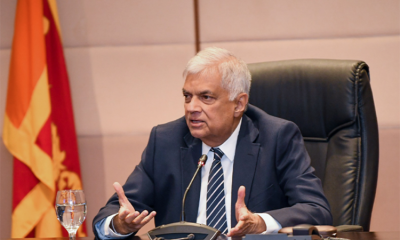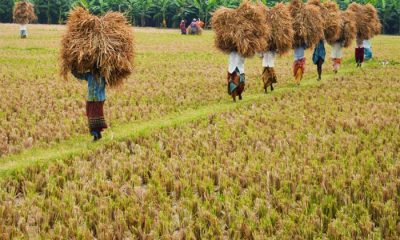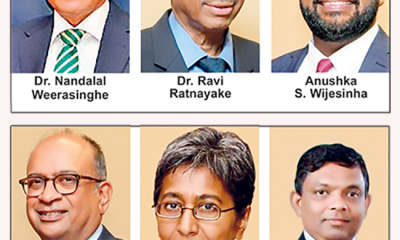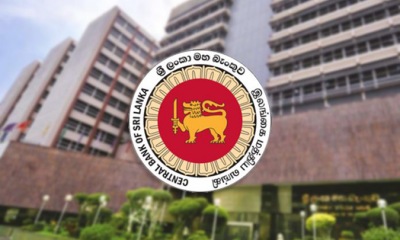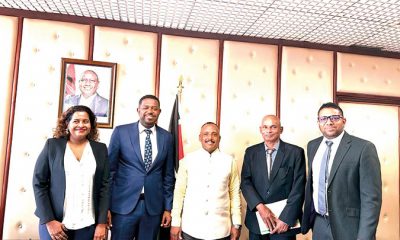News
Agriculture don expects upcountry vegetable prices to drop by end February
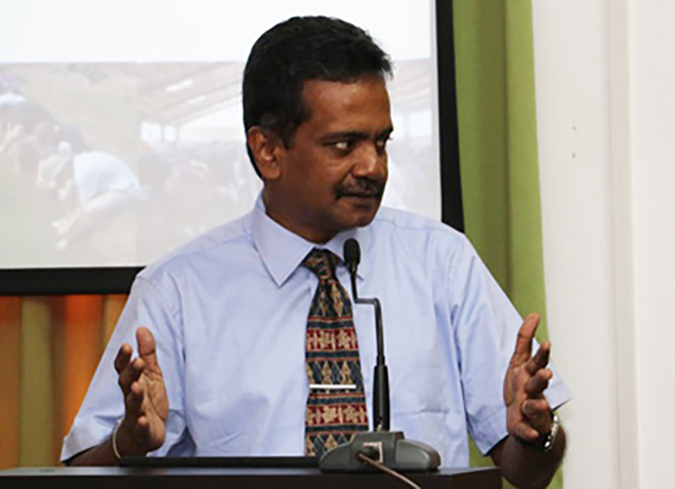
By Rathindra Kuruwita
The prices of upcountry vegetables like carrots will come down at the end of February, says Prof. Buddhi Marambe of the Agriculture Faculty, University of Peradeniya.Heavy rains during the past few months were the main reason for the current increase in the prices of vegetables, Prof. Marambe said, adding that December and April were festive seasons in Sri Lanka, and the prices of food usually went up during those months. Traditionally, the prices of vegetables usually go up in November, December, January, April, May and June.
“However, there have been some unique reasons for the current spike in vegetable prices. We saw heavy rains in October, November and December 2023. The average monthly rainfall in the upcountry in those three months, was about 400 mm,” Prof. Marambe said, adding that during tthose months, there were rains for at least 25 days of the month. When there is a cloud cover, it is difficult for plants to perform photosynthesis. Thus, the harvest drops.
“This is why we have a lot of smaller carrots.”
Sri Lankan farmers, especially vegetable growers, did not adhere to stringent soil conservation techniques, Prof. Marambe said. The heavy rains in October, November and December 2023 led to severe soil erosion.
“Some farmers opt out of farming when there are heavy rains. Although, usually farmers try to increase vegetable production between December and January, they failed to do so this year due to the heavy rains.”
Prof. Marambe said that the rainy weather is coming to an end and that farmers have started to increase their production due to the rise in prices.
“So technically, the produce should start reaching the markets by the end of February. Don’t also forget that the demand has collapsed because of high prices.”
The academic said that Sri Lanka must look at agriculture as a whole. Right now, the government focuses on the farmers when the crops are planted and then on the consumers when the harvest comes into the market.
“This often leads to contradictory policy decisions. We must now ensure that we don’t lose track of paddy cultivation.”
Prof. Marambe mentioned that paddy can remain partially underwater for a few days and survive. However, if they are submerged by water, they too will not be able to perform photosynthesis.
“Once the floods go down, there is a possibility that diseases might increase. We must not be scared, but we must be vigilant. Farmers must talk to their agricultural officer if they notice anything different about the paddy plant.”
He also said that there are several conflicts in the world, and in some instances, trade has been affected. There may be a high probability of Sri Lanka encountering challenges in securing the inputs needed for agriculture.
“We already know how much we need to produce to ensure a smooth supply. We don’t import fresh vegetables, and we know how many vegetables we need, how many acres we need to plant, and what inputs we need. So we don’t really need to wait till the very end to import the necessary inputs. We wait till the last moment and then lament that there were price increases in the world market, etc. We need to be ready and order the inputs we need.”
Sri Lanka has a long history of making ad hoc decisions when it comes to agriculture, he said. The country needs to look at the data and analyze it before making a decision.
“We as scientists also have a responsibility to collect and present the data in a way that policymakers can make clear and informed decisions. The governments must also try to be as scientific as possible. Until both sides work together, we will continue to land ourselves in messes.”
Prof. Marambe said there are many issues with regard to Sri Lankan agriculture storage facilities. Some officials seem to believe that storage only involves dumping goods into a building and closing the door.
“When we store food, even seeds, we must store them in the right conditions. There were reports of potato seeds that were to be distributed to farmers getting spoiled because of bad storage. Farmers keep on suffering because of uninformed decisions and practices.”
Prof. Marambe said the reason for the heavy rains we experienced was the Indian Ocean Dipole (IOD) which is an irregular oscillation of sea surface temperatures in which the western Indian Ocean becomes alternately warmer and then colder than the eastern part of the ocean. When the western Indian Ocean becomes warmer, our Western slope will experience heavy rains.
“We did the studies, and we told the Minister of Agriculture that Sri Lanka will see heavy rains in October, November and December 2023.”
He added that there are many dedicated agriculture researchers in Sri Lanka who are studying IOD and its impact on our agriculture, and with their hard work, Sri Lanka should be able to take the best advantage of rains and minimize the damage caused by heavy rains in the future.
News
US sports envoys to Lanka to champion youth development

The U.S. Embassy in Colombo welcomed the U.S. Sports Envoys to Sri Lanka, former National Basketball Association (NBA) and Women’s National Basketball Association (WNBA) players Stephen Howard and Astou Ndiaye, from June 8 through 14.
The Public Diplomacy section of the U.S. Embassy said that it would launch a weeklong basketball program intended to harness the unifying power of sports, made possible through collaboration with Foundation of Goodness and IImpact Hoop Lab.
While in Sri Lanka, Howard and Ndiaye, both retired professional basketball players, will conduct a weeklong program, Hoops for Hope: Bridging Borders through Basketball. The Sports Envoys will lead basketball clinics and exhibition matches and engage in leadership sessions in Colombo and Southern Province for youth aged 14-18 from Northern, Uva, Eastern and Western Provinces, offering skills and leadership training both on and off the court. The U.S. Envoys will also share their expertise with the Sri Lanka Basketball Federation, national coaches, and players, furthering the development of basketball in the country. Beyond the clinics, they will collaborate with Sri Lankan schoolchildren to take part in a community service project in the Colombo area.
“We are so proud to welcome Stephen and Astou as our Sports Envoys to Sri Lanka, to build on the strong people-to-people connections between the United States and Sri Lanka,” said U.S. Ambassador Julie Chung. “The lessons that will be shared by our Sports Envoys – communication, teamwork, resilience, inclusion, and conflict resolution – are essential for leadership development, community building, equality, and peace. The U.S. Sports Envoy program is a testament to our belief that sports can be a powerful tool in promoting peace and unity.”
News
Rahuman questions sudden cancellation of leave of CEB employees

SJB Colombo District MP Mujibur Rahuman in parliament demanded to know from the government the reasons for CEB suspending the leave of all its employees until further notice from Thursday.
MP Rahuman said that the CEB has got an acting General Manager anew and the latter yesterday morning issued a circular suspending leave of all CEB employees with immediate effect until further notice.
“We demand that Minister Kanchana Wijesekera should explain this to the House. This circular was issued while this debate on the new Electricity Amendment Bill was pending. There are many who oppose this Bill. The Minister must tell parliament the reason for the urge to cancel the leave of CEB employees,” the MP said.However, Speaker Mahinda Yapa Abeywardena prevented Minister Wijesekera responding to the query and said that the matter raised by MP Rahuman was not relevant.
News
CIPM successfully concludes 8th Annual Symposium

The Chartered Institute of Personnel Management (CIPM) successfully concluded the 8th Annual CIPM Symposium, which took place on 31st May 2024. Themed “Nurturing the Human Element—Redefining HRM in a Rapidly Changing World,” the symposium underscored the pivotal role of human resource management (HRM) in today’s dynamic global landscape. Since its inception in 1959, CIPM has been dedicated to advancing the HR profession through education, professional development, and advocacy, solidifying its position as Sri Lanka’s leading professional body for HRM.
Ken Vijayakumar, the President of the CIPM, graced the occasion as the chief guest. The symposium commenced with the welcome address by the Chairperson, Prof. Arosha Adikaram, followed by the Web Launch of the Symposium Proceedings and Abstract Book by the CIPM President. The event featured distinguished addresses, including a speech by Chief Guest Ken Vijayakumar, President of CIPM, and an address by Guest of Honor Shakthi Ranatunga, Chief Operating Officer of MAS Holdings Pvt. Ltd., Sri Lanka.
The symposium also featured an inspiring keynote address by Prof. Mario Fernando, Professor of Management and Director of the Centre for Cross Cultural Management (CCCM) at the University of Wollongong, Australia.
Vote of Thanks of the inauguration session was delivered by Dr. Dillanjani Weeratunga, Symposium Co-chair.
The symposium served as a comprehensive platform for researchers to present their findings across a wide range of critical topics in HRM. These included Cultural Diversity and Inclusion, Talent Development and Retention, Ethical Leadership and Corporate Social Responsibility, Adapting to Technological Advancements, Mental Health and Well-being at Work, Global Workforce Challenges, Employee Empowerment, and Reskilling and Upskilling.
The plenary session was led by Prof. Wasantha Rajapakse. Certificates were awarded to the best paper presenters during the valedictory session, followed by a vote of thanks delivered by Kamani Perera, Manager of Research and Development.
The annual symposium of CIPM was a truly inclusive event, attracting a diverse audience that spanned undergraduates, graduates, working professionals, research scholars and lecturers. This widespread interest highlights the symposium’s significance in the field of HRM, offering a unique opportunity for everyone to network and learn from scholarly brains.The CIPM International Research Symposium was sponsored by Hambantota International Port, Sri Lanka Institute of Information Technology (SLIIT), E B Creasy & Co. PLC, and Print Xcel Company.


